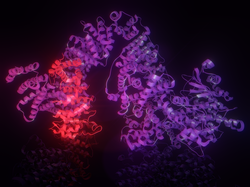Serine/threonine-protein kinase ATR, also known as ataxia telangiectasia and Rad3-related protein (ATR) or FRAP-related protein 1 (FRP1), is an enzyme that, in humans, is encoded by the ATR gene.[5][6] It is a large kinase of about 301.66 kDa.[7] ATR belongs to the phosphatidylinositol 3-kinase-related kinase protein family. ATR is activated in response to single strand breaks, and works with ATM to ensure genome integrity.
- ^ a b c GRCh38: Ensembl release 89: ENSG00000175054 – Ensembl, May 2017
- ^ a b c GRCm38: Ensembl release 89: ENSMUSG00000032409 – Ensembl, May 2017
- ^ "Human PubMed Reference:". National Center for Biotechnology Information, U.S. National Library of Medicine.
- ^ "Mouse PubMed Reference:". National Center for Biotechnology Information, U.S. National Library of Medicine.
- ^ Cimprich KA, Shin TB, Keith CT, Schreiber SL (April 1996). "cDNA cloning and gene mapping of a candidate human cell cycle checkpoint protein". Proceedings of the National Academy of Sciences of the United States of America. 93 (7): 2850–2855. Bibcode:1996PNAS...93.2850C. doi:10.1073/pnas.93.7.2850. PMC 39722. PMID 8610130.
- ^ Bentley NJ, Holtzman DA, Flaggs G, Keegan KS, DeMaggio A, Ford JC, et al. (December 1996). "The Schizosaccharomyces pombe rad3 checkpoint gene". The EMBO Journal. 15 (23): 6641–6651. doi:10.1002/j.1460-2075.1996.tb01054.x. PMC 452488. PMID 8978690.
- ^ Unsal-Kaçmaz K, Sancar A (February 2004). "Quaternary structure of ATR and effects of ATRIP and replication protein A on its DNA binding and kinase activities". Molecular and Cellular Biology. 24 (3): 1292–1300. doi:10.1128/MCB.24.3.1292-1300.2003. PMC 321456. PMID 14729973.




